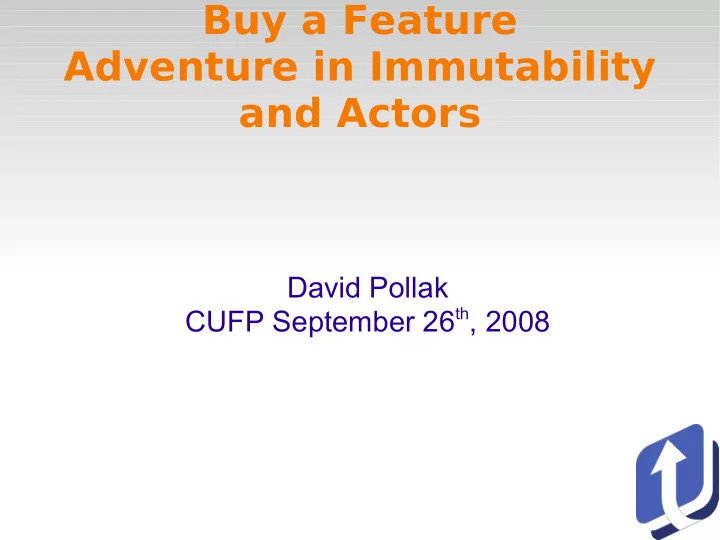

Buy a Feature Adventure in Immutability and Actors David Pollak CUFP September 26 th , 2008
David Pollak Not strict, but pretty lazy Lead developer for Lift web framework Scala since November 2006, Ruby/Rails, Java/J2EE Spreadsheet junky (writing more than using) Paying work (all Lift based): Enthiosys' Buy a Feature SAP Community ESME project
About Buy a Feature (online) The first of Enthiosys' online Innovation Games Serious Gaming for Agile Product Management Game Play: Create a list of product features with estimated costs 4-8 player buy features that they want Motivate negotiations between players Learn how players sell each other on features
Buy a Feature
About Scala & Lift Scala Hybrid OO & Functional Language Compiles to Java Byte-Code and runs fast on JVM Benefits similar to those of F# FP concepts including Actors and Immutablity Lift Concise, powerful web framework Leverages Scala's functional features Awesome Comet and AJAX support
Buy a Feature Architecture Lift based Comet front-end UI state managed in Lift CometActors All user interaction via JSON messages/events Events sent to GameActor GameActor folds GameBoard and writes events GameActor sends GameBoard, etc. to CometActors
Actors – Why? Excellent concurrency management Event oriented Asynchronous case EndGame => recordGameEnding() this ! ChatMessage(Empty, timeNow, "Game Ended", Empty, Empty) eachListener(_ ! EndGame)
Actors – Where? UI Pushes UI state changes out to browser Listen for incoming events/messages Cross-session Game managers Incoming events serialized → Incoming events New State → New State Listners (other Actors)
Events – Why? Anything that can change state is an Event Events are timestamped and persisted in RDBMS Events can be replayed through the system for TiVo style game replay and pausing Complementary to Actors
Events – Where? → Broswer Server (CometActor) → CometActor GameActor → GameActor RDBMS GameActor → Listners (mostly UI CometActor) CometActor → Browser
Post-Processing Game Events are recalled, in order from RDBMS Game Events are folded into GameBoard events.foldLeft(game.startingGameBoard){ case (gb, (ev, (ft, bid))) => gb.change(players(ev.theUser), gameInfo.features(ft), bid, ev.when)} GameBoard is queried for results GameBoard is immutable, so a separate copy can be associated with each Event Thus, there's a freeze-frame at each event
Defects Lift session bugs Lots of stupid problems working around J2EE sessions Why? I'm a moron Parsing → Users entering free text lots of unexpected input Most of our tests are here Post-processing Didn't fold GameBoard, rolled my own, bad results Too many GameBoards in memory
Initial Sell of Scala & Lift If you want me, you'll choose Lift 4 weeks of 'I could do this faster in Rails' Included client on SVN checkins and rants turned to questions (he's a Lisp and Smalltalk guy) Then the first code went live No questions since SAP's interest in Lift are validating this choice Allows for 'Exploration Driven Development'
Team Integration Disbelief over code size Attempts to dive below the abstractions Java-like coding on the road to functional Eventual adoption of map, fold, and filter NPE: Thing of the past Lack of tool support and examples in the wild are speed bumps, especially with existing code Need a team mentor to help with transition
Conclusion Amazing productivity for people once up FP curve Very low defect rate None of the defects were concurrency related!! None of the defects were concurrency related!! Very flexible system (added Flash front end in a day)
End http://buyafeature.com Questions?
Scala: Functions are Objects Objects can be passed as parameters Functions are syntactically easy to create var name = “” SHtml.text(name, name = _) They bind to variables/values (e.g. name)
Partial Functions PartialFunction[A,B] extends Function1[A,B] isDefinedAt(x: A) Better known as pattern matching: { case Foo(bar) => bar case Baz(dog) => dog }
Composing Partial Function { case Foo(bar) => bar case Baz(dog) => dog } orElse { // compose case Moo(cow) => cow case Meow(cat) => cat }
Extractors and Guards Extract data while matching other parts in a pattern: { case “Foo” :: id :: Nil => doIt(id) } Guards: { case “Foo” :: id :: Nil if isValid(id) && loggedIn_? => doIt(id) }
Remembering Functions Functions are Objects Map[String, String => XML] Map[String, PartialFunction[String, XML]] GET /ajax?OPAQUE_ID=someValue Map[OPAQUE_ID](someValue)
XML literals and manipulation In Scala, XML is like String: supported at the language level and immutable <foo>{(1 to 10). map(i => <val>{i}</val>)}</foo> (xml \ “val”).map(_.text.toInt). .foldLeft(0)(_ + _) == 55
Actors and Partial Functions Threadless, stackless units of execution React to events and otherwise consume nothing but memory react(PartialFunction[Any, Any]) → react {case Foo(bar) => doSomething(bar) case Baz(dog) => doElse(dog) } react(primaryHndlr orElse secondaryHndler)
Lift REST APIs LiftRules.addDispatchBefore { case RequestMatcher( RequestState( "showstates":: xs, _),_) => XmlServer.showStates(xs) } def showStates(...) = XmlResponse( <states renderedAt={timeNow.toString}> ... </states>)
Lift and HTML forms var name = “” text(name, name = _) def setLocale(loc: String) ... select(Locale.getAvailableLocales.toList . map(lo => (lo.toString, lo.getDisplayName)), setLocale)
Lift & AJAX AJAX elements are bound to functions: a(() => {cnt = cnt + 1; SetHtml("cnt_id", Text( cnt.toString))}, “click me”) ajaxSelect(opts, v => DisplayMessage("You selected "+v))
Lift CometActors Lift deals with all the plumbing: def render = bind("time" -> timeSpan) override def lowPriority = { case Tick => reRender(false) }
Recommend
More recommend